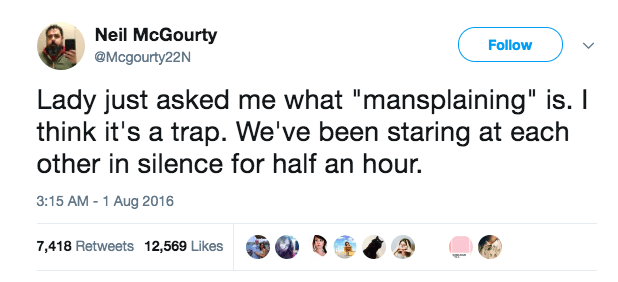Earlier this past week I asked my friends on Facebook what they would change if they could somehow change one thing about the dating process. A number of men intimated they wish it were a more common expectation for women to make the first move, like the way that it works on Bumble. So the next day I posed a thought experiment:
What if tomorrow morning you woke up in a world in which women had to make the first move in any relationship? Imagine for a moment how the world, and dating, would be different if men were strongly stigmatized for making the first move. How would the world be different?
First off, I’ll admit up front what several of my friends pointed out, namely that my question was heteronormative, as if I were implicitly assuming people date only members of the opposite sex. I mean what would this thought experiment mean for gay men? I guess they just wouldn’t date at all? And if you’re bisexual, you’ve just had half of your sexual self shut down.
A Deeper Problem
Friends were also quick to point out that another kind of privilege blindness was at work beneath the surface of this question. What good would it do to change the world only on this one small detail if all the underlying historical and social causes for our normative expectations were not changed as well? If this is a world in which women have to ask out the men, would this alternate reality also incorporate other shifts in social power to keep from undermining the very thing we’re trying to imagine?
One friend, Kate M, drove this point home with her response:
That is a world in which women can walk down the street without fear of harassment. A world in which we don’t have to worry our boss arranging that dinner meeting was actually a way to force a date. A world where we don’t have to worry that a date will decide dinner means we OWE him sex.
Imagine how freeing that would be.
 Her comment draws out the social inequity that undermines the thought experiment before it can even begin, because in a world where men are expected to initiate romantic overtures, we have to grapple with our own fears of rejection while women under this social economy have to grapple with their fear of what men will do to them if they rebuff their advances. It’s not so simple as just changing this one unspoken rule of dating (which apparently most of my female friends don’t follow anyway).
Her comment draws out the social inequity that undermines the thought experiment before it can even begin, because in a world where men are expected to initiate romantic overtures, we have to grapple with our own fears of rejection while women under this social economy have to grapple with their fear of what men will do to them if they rebuff their advances. It’s not so simple as just changing this one unspoken rule of dating (which apparently most of my female friends don’t follow anyway).
As if on cue, the very next comment I got on my wall was from a man (let’s call him Bob) seeking to invalidate Kate’s concern, offering mock pity for her inability to escape the consequences of the male gaze:
Oh indeed Kate… you’d never have to actually stand up for yourself. We would all be doing it for you because you are so weak and oppressed that you can’t say no. Poor you !!
Note that Kate never said she couldn’t stand up for herself. She was simply pointing out that doing so would have inequitable consequences: A boss dealing with a rejection of a romantic overture will get over his discomfort a lot faster than the woman who never gets the promotion because her boss’s feelings got hurt. Likewise, the man who buys the woman dinner but doesn’t get sex out of it may have to get his own rocks off later that night. But the woman who declines to sleep with him has legitimate reason to expect this could be yet another man who will deal with his rejection by calling her a litany of names or even worse. The threat of violence is always very close to the surface, and you can never know for sure until it’s too late.
Bob wasn’t done invalidating her yet, however. He went on to minimize her concerns by comparing them to the concerns of women in countries where they aren’t even allowed to say no at all:
Hey Kate think of all those women in the rest of the world who can’t leave their house without a male escort. Have their genitals mutilated, have to wear a burka so they don’t temp [sic] us… can be executed for being raped. Yes you have it much worse having some poor guy whistle at you.
So, in short, Bob’s argument is that women in America should stop complaining of the social inequities that are in place because women in other countries have it much worse. This is called the fallacy of relative privation, by the way.
We’re Still Arguing About This?
Anyone who’s been following the atheist movement for very long will immediately recognize this response. It stems from a collective argument started many years ago after a female vlogger complained at a conference about being invited into a man’s hotel room at 4am while alone in an elevator with him, even though to her knowledge she had shown him no signs of sexual interest. Her complaint met with a deluge of angry reactions from men who took this personally, and it took almost no time at all for the rape threats to emerge.
This is the typical experience of women pretty much everywhere. If you don’t know that yet, you’re not listening. Or else social media has done its work of cutting you off from a massive throng of women who are talking about this but you still can’t hear them.
No less than Richard Dawkins himself waded into this argument when he used the very same argument tactic used above, only he later apologized for it, saying:
There should be no rivalry in victimhood, and I’m sorry I once said something similar to American women complaining of harassment, inviting them to contemplate the suffering of Muslim women by comparison.
Evidently this fellow didn’t learn from Dawkins’s example. Or maybe he did, actually. Because while the (somewhat qualified) apology was necessary, it was offered more than half a year after the fact, and only after feeling the impact of a deep fissure ripping through the atheist community, fueled in no small part by a handful of YouTubers who by no means should have as many people hanging on their every word as they do.
I can’t help but note that the man missing the point here is a retired, straight, white male who most likely has never had to fend off an unwanted advance. Or maybe he has, but it’s been a long, long time. Such a fellow would not naturally identify with the lived experience of a woman in a world where you get rape threats just for asking men to learn better social skills.
But Bob doesn’t have to be so limited by his demographics. He could just listen to women and learn from what they are saying. I saw no evidence of that happening on my wall, unfortunately, which led me to spend the rest of the evening trying to put into words why a man like him would not be able to see what’s wrong with what he is saying.
Incidentally, I’d sooner throw myself down a steep hill than wade into this never-ending contentious debate. Most days it feels like it would accomplish the same ends, only faster—get it over with more quickly. I’m pretty sure I’ve already forfeited any chance I had to be invited to speak at the big annual atheist conference that Bob founded several years ago and still manages to this day. *shrug* I’ll just add that one to the list.
But I think I can shed a little bit of light on this discussion if anybody’s interested in hearing what another straight white male has to say about all of this.
Because the thing is, what people like Bob are saying is technically correct, and therein lies the problem.
The problem isn’t that they’re wrong—they are right, from a certain point of view. But they’re stuck inside a tiny bubble without any apparent awareness that they’re missing a bigger picture, and that’s a much bigger problem.
A Zero Sum Game?
Technically, it’s true that an unwanted sexual advance from a man who never lays a finger on the woman is comparatively less egregious than actual genital mutilation. I don’t know anyone who is seriously trying to equate the two. Except for Bob, sarcastically.
But what use does that comparison serve? What good does this do for the women in the worse situations? Does it actually help a woman in Somalia if over in America Kate stops complaining about her own social inequities? I find it difficult to see how it could.
So what impulse is driving Bob’s need to change the subject like that? Why can’t he just let the women who are verbalizing their concerns say what’s on their minds without having to jump into the fray with a comment designed to make their hardships look smaller? Here’s what I think is going on:
People like Bob see social equity as a zero sum game, a limited economy in which one group cannot gain new leverage without necessarily depriving others of their own. In short, they feel the world only has a limited number of f**ks to give about anything, and they believe these angry women are depriving less fortunate women of their own due f**ks.
But that’s not how it works at all. The whole world doesn’t actually run out of f**ks to give.
It’s not as if people everywhere will hear that women in Pakistan are being executed for reporting their own rapes only to respond with, “I’d love to care about that, but I already used up all my energy fighting for gender inclusive pronouns. I’m all out of f**ks! Sorry!” The world wasn’t created with a limited supply of them, forcing us to conserve them so that when the really important stuff rolls around, we’re not left empty handed.
So why does Bob seem to think that’s how it is? Why does he think social concern is a closed economic system?
It’s because he has felt his own social capital diminished over the course of his lifetime, and it feels terrible to lose that place of privilege.
I’ll give an example from my own experience. A couple of years ago, I was included in a discussion among a group of atheists making plans to bring in speakers over the upcoming year. Organizers were looking for suggestions, and my name came up multiple times in the discussion (don’t worry about my head getting bigger…I just had several friends in the group), but the organizers expressed that they needed to exclude me from the list because I’m a straight, white male and they were trying very hard to create a more diverse speaker’s list.
Did I stomp my feet and protest that I was being marginalized because of my own inescapable demographics? No, I didn’t. Because I understood exactly why they were trying to elevate more of the kinds of voices that for various reasons don’t ordinarily get heard. And I’m not so insecure that I feel this takes something away from me which I can never get back any other way. I know good and well that I have a useful perspective to offer the movement, and my ego isn’t that fragile. Incidentally in the end I got to address that group anyway because one of the other speakers cancelled at the last minute! But that’s beside the point.
The irony here is that men like me (and Bob) often complain about identity politics, accusing people of leaning on their belonging to marginalized classes rather than seeking to forge their own way in life through hard work and resourcefulness. But then people like us go on to complain that our culture is beginning to disadvantage us because of who we are. In that moment we are tacitly admitting that we don’t really believe that we can make it on our own merits. We are suggesting that the work we do, in and of itself, isn’t enough to earn for us the place at the table that we feel we deserve.
How else would you explain a man feeling so competitive about the issue of sexual harassment that he would stop scrolling upon seeing a woman venting about her own experience and then jump in to tell her she’s being a “bad feminist?”
That is, by the way, the most textbook example of mansplaining I’ve seen on my wall in a really long time.
Incidentally, that tweet ^^ cracks me up even more now because one day I found myself in the curious position of having to explain to my very conservative daughters what mansplaining is since terms like that don’t filter down into the Baptist youth group vernacular. Of course the moment I defined what it is, they all said, “Oh yeah, that happens all the time. That’s so annoying! Glad to know there’s a word for it.”
Bob may sound like he’s upset about the plight of Muslim women, but really he’s upset about himself. That’s why he would behave like a man who feels he has to compete with women for…something. But what? What is it that he feels he is losing to them?
He is worried the world is giving away all its f**ks and there won’t be enough left over for him, in the end.
Lots More Where That Came From
Like with most debates that never seem to go away, the problem with discussing the issue of privilege with people who have always taken their social status for granted is that they are right from a certain point of view. In fact, for any debate to continue as long as this one has, there must be at least some validity to both sides of the argument.
You cannot change the mind of someone who knows he is right. That’s what makes fights like this so hard to resolve. It’s not that Bob is wrong, it’s just that his frame of reference is far too small. It is roughly the size of, well…himself.
Bob is like a boat riding a giant wave out on the ocean. He feels it every time the water rises and falls, and right now whether he knows how to verbalize it or not he feels the water beneath him dropping. He’s been feeling it for years, that sinking feeling that things are getting worse for him all the time. He is losing social status and political capital on account of other people coming along and taking what used to be his.
But the ocean is a really big place, so while it may feel to Bob like everything is dropping, if he could only widen his perspective he would see that there’s plenty more water where that came from, plenty more f**ks to go around for everyone. He could take a deep breath and just let other people vent about their problems without feeling the need to chime in only to try and minimize them. That helps absolutely no one at all.
The irony is that Bob took the time to put Kate back in her place because he felt she was being too whiney. But what was Bob doing himself? Does he not understand how it looks for a guy to be unable to hear a woman vent about her own social inequities without having to offer his unsolicited opinion on the matter, one intended to make her stop talking about it? What does that say about him? We were just doing a thought experiment about dating and he swoops in from out of nowhere, picking fights with multiple women on my wall. Something’s obviously eating at him. It’s his belief that the world only has a limited number of f**ks to give, and ultimately that would leave less for him.
Well, get over it, Bob. Do the work you do and let it speak for itself. If you really think all this identity politics is bullsh** then you should stop acting like a man who fears he’s becoming as disregarded as everyone else.
[Image Source: Shutterstock]
















